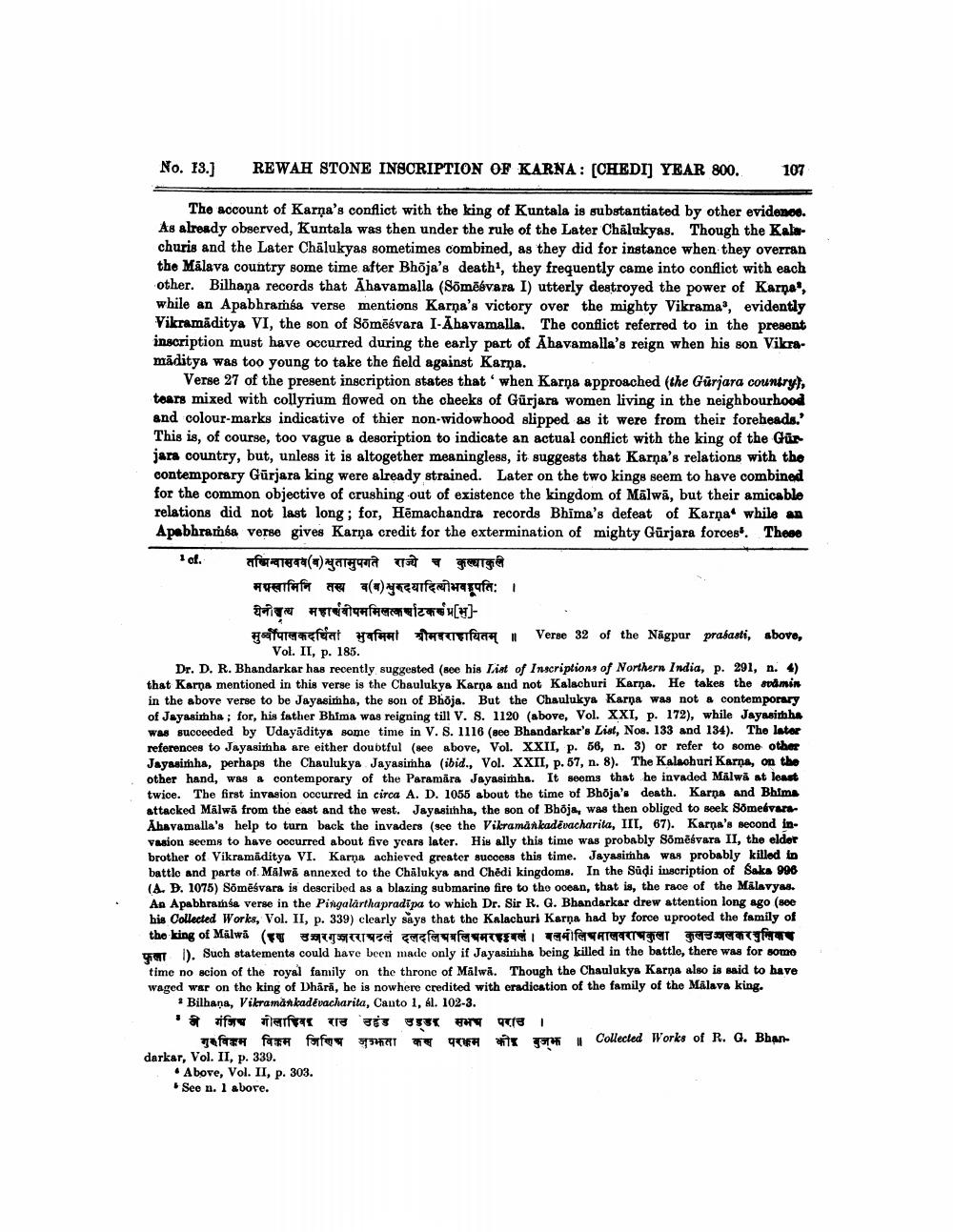________________
No. 13.)
REWAH STONE INSCRIPTION OF KARNA: (CHEDI] YEAR 800.
107
The account of Karna's conflict with the king of Kuntala is substantiated by other evidence. As already observed, Kuntala was then under the rule of the Later Chalukyas. Though the Kalachuris and the Later Chālukyas sometimes combined, as they did for instance when they overran the Mālava country some time after Bhõja's death, they frequently came into conflict with each other. Bilhaņa records that Āhavamalla (Sõmēbvara I) utterly destroyed the power of Karna', while an Apabhramsa verse mentions Karna's victory over the mighty Vikrama', evidently Vikramaditya VI, the son of Somēśvara I-Abavamalla. The conflict referred to in the present inscription must have occurred during the early part of Ahavamalla's reign when his son Vikramāditya was too young to take the field against Karna.
Verse 27 of the present inscription states that when Karņa approached (the Gurjara country, toars mixed with collyrium flowed on the cheeks of Gurjara women living in the neighbourhood and colour-marks indicative of thier non-widowhood slipped as it were from their foreheads.' This is, of course, too vague a description to indicate an actual conflict with the king of the Gür jara country, but, unless it is altogether meaningless, it suggests that Karna's relations with the contemporary Gurjara king were already strained. Later on the two kings seem to have combined for the common objective of crushing out of existence the kingdom of Mālwā, but their amicable relations did not last long; for, Hēmachandra records Bhima's defeat of Karna while an Apabhramba verse gives Karņa credit for the extermination of mighty Gürjara forces. These
तमिवासवव(ब) धुतामुपगते राज्ये च कुल्याकुले मनस्वामिनि तस्य व(ब) धुमदयादित्योभवहपतिः । 9719 Arafavica []acaferat af at E c e Verse 32 of the Nagpur prasasti, above,
Vol. II, p. 185. Dr. D. R. Bhandarkar has recently suggested (see his list of Inscriptions of Northern India, p. 291, n. 4) that Karna mentioned in this verse is the Chaulukya Karna and not Kalachuri Karna. He takes the admin in the above verse to be Jayasimba, the son of Bhoja. But the Chaulukya Karna was not a contemporary of Jayasinha; for, his father Bhima was reigning till V. S. 1120 (above, Vol. XXI, p. 172), while Jayasinha was succeeded by Udayāditya some time in V. S. 1116 (aee Bhandarkar's List, Nos. 133 and 134). The later references to Jayasimha are either doubtful (see above, Vol. XXII, p. 56, n. 3) or refer to some other Jayasimha, perhaps the Chaulukya Jayasinha (ibid., Vol. XXII, p. 67, n. 8). The Kalaohuri Karna, on the other hand, was a contemporary of the Paramira Jayasimha. It seems that he invaded Malwa at least twice. The first invasion occurred in circa A. D. 1055 about the time of Bhoja's death. Karna and Bhima attacked Mälwa from the east and the west. Jayasinha, the son of Bhoja, was then obliged to seek Somebvara. Ahavamalla's help to turn back the invaders (see the Vikramankadēvacharita, III, 67). Karna's second inVasion seems to have occurred about five years later. His ally this time was probably Somēsvara II, the elder brother of Vikramaditya VI. Karna achieved greater success this time. Jayasimha was probably killed in battlo and parts of Malwă annexed to the Chalukya and Chedi kingdoms. In the Südi inscription of Saka 996 (A.D. 1075) Sõmēsvara is described as a blazing submarine fire to the ocean, that is, the race of the Malavyas. An Apabhramsa verse in the Pingalarthapradipa to which Dr. Sir R. G. Bhandarkar drew attention long ago (see his Collected Works, Vol. II, p. 339) clearly says that the Kalachuri Karpa had by force uprooted the family of the king of Malwa ( S EO ofauteur Taufe get 1979 eragir
1). Such statements could have been made only if Jayasimha being killed in the battle, there was for somo time no scion of the royal family on the throne of Malw.. Though the Chaulukya Karna also is said to have waged war on the king of Dhara, he is nowhere credited with cradication of the family of the Malava king.
* Bilhana, Vikramankadevacharita, Canto 1, 6l. 102-3. " # wife after 3 3 33
18 Jafar far forfour 93916 4 90 x
# Collected Works of R. G. Bhandarkar, Vol. II, p. 339.
• Above, Vol. II, p. 303. See n. 1 above.




